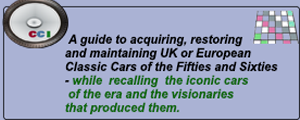
 Anyone buying a car to restore should consider that all of its filters will need to be replaced.
Anyone buying a car to restore should consider that all of its filters will need to be replaced.
The practice of fitting of cabin filters in passenger cars has been around for just fifty years , making them a relatively new development in passenger comfort.
During the early seventies, the World's major car manufacturers became aware of the importance of improving air quality within the cabin as the major cities became increasingly congested.
The cabin filter is a type of air filter that bears more than a passing resemblance to an engine air filter- although it carries out a completely different but no less important function.
 The dust and pollen filtration element has been charged electrostatically like engine air filters. Its fibre particles have been given a negative or positive electric charge, causing airborne particles to be either positively or negatively charged, attracting the opposite-charged fibres.
The dust and pollen filtration element has been charged electrostatically like engine air filters. Its fibre particles have been given a negative or positive electric charge, causing airborne particles to be either positively or negatively charged, attracting the opposite-charged fibres.
As well as this significant function, the filter performs a process known as "mechanical filtration," meaning that foreign bodies in the system will trap particles sometimes larger than themselves and eradicate noxious odours that may have infiltrated the system.
To operate at maximum efficiency, the charcoal on the filter needs to be treated with certain chemicals, activated when the engine reaches a specific temperature.
 There are no fixed levels at which the chemicals will be activated, with each filter manufacturer setting their own criteria based on tests carried out by the R&D departments of the company.
There are no fixed levels at which the chemicals will be activated, with each filter manufacturer setting their own criteria based on tests carried out by the R&D departments of the company.
Charcoal is known for being incredibly porous, with each pore being an exposed surface, meaning that a charcoal covered filter will be particularly efficient when it comes to trapping noxious gases.
 Recommendations on when it is best to change air filters vary, with the general consensus appearing to be between 12,000 or 15,000 miles, although that figure can be affected by where the vehicle spends most of its time.
Recommendations on when it is best to change air filters vary, with the general consensus appearing to be between 12,000 or 15,000 miles, although that figure can be affected by where the vehicle spends most of its time.
If the vehicle is primarily driven in heavy traffic in an area with sub-standard air quality, the cabin air filter will need to be replaced more often.
A car driven regularly next to the coast will also need to have its cabin air filter changed more frequently, as there will be a lot of dust and fine sand particles to be filtered out.
 Signs that the cabin air filter is due to be changed is when airflow is reduced, or noise from the car's fans begins to increase.
Signs that the cabin air filter is due to be changed is when airflow is reduced, or noise from the car's fans begins to increase.
Take me back to the home page.
ub6


